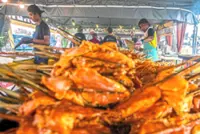THE flock of pigeons at Ipoh Padang in Perak may be an attraction for some folk, but the mess the birds leave behind is an eyesore.
The pigeons are often found near the fountain and “Ipoh” sign, a popular photo-taking spot.
However, the bird droppings in the area have become a cause for concern, especially for those who frequent the park.
Salesman Kong Ywai Yin, 53, said the pigeons kept returning to the site because people had been feeding them.
“While feeding animals is an act of kindness, it can also bring about harmful health concerns.
“There is a need for stricter enforcement by the local council.
“Other local councils such as Penang Island City Council have started issuing fines for feeding birds, but no action has been taken here,” he added.

Kong said pigeon droppings could be harmful and public health should be prioritised.
“I have read in the newspapers that pigeon droppings can cause serious health problems.
“This issue has been ongoing for some time and I hope we can see it resolved soon.
“If people really feel like feeding the birds, then they should go to the zoo, forest or hiking trails and feed them,” he added.
A 58-year-old janitorial worker, who declined to be named, said bird droppings were also found along five-foot-ways.
“I have been cleaning away bird droppings from this walkway in front of the bank every day for the past 10 years,” she added.

General worker E. Christina, 50, said people had complained to Ipoh City Council about the bird feeding activity at Ipoh Padang.
“However, I am not sure whether action has been taken to deter the people,” she added.
Photographer K. Kumaran, 37, said pigeons often flocked to the tourist attraction.
“Tourists usually come here to snap pictures of them being fed.
“It usually draws visitors, especially in the evenings around 5pm,” he said, adding that it had been taking place for about 20 years.
Cashier R. Latha, 37, said she did not mind people feeding the birds.
The public, she said, usually bought pigeon food such as broken rice and grains from nearby shops at RM3.90 per 400g.
“The birds are usually fed in the morning after about 10am or in the evening after 3pm.
“And people take photos of the activity,” she said.

Complaints to MBI
Meanwhile, Ipoh mayor Datuk Rumaizi Baharin said the city council had received nine reports related to feeding pigeons so far this year.
These reports, he explained, fell under the nuisance category for complaints.
“We take all feedback seriously and are actively addressing the concerns raised, to ensure transparency and continuous improvement.
“Our team remains committed to resolving these matters efficiently and maintaining public trust,” he said when contacted.
However, Rumaizi said there had not been any complaints about people falling sick because of pigeon droppings.
“We urge the community, both residents and tourists, to respect and follow the regulations set by the city council.

“We hope people will refrain from feeding the pigeons at Ipoh Padang.
“This will help maintain a cleaner, safer and more comfortable environment for everyone to enjoy,” he added.
When contacted, Perak local government committee chairman Sandrea Ng said according to health experts, pigeon droppings could pose health risks as they might contain bacteria, fungi and other pathogens that would lead to respiratory illnesses, infections and other health concerns.
“Diseases such as histoplasmosis (fungal infections in lungs), psittacosis (parrot fever) and salmonellosis (food poisoning) have been linked to pigeon dropping exposure.
“Additionally, pigeon droppings are acidic and can accelerate the deterioration of building materials, leading to structural damage over time.
“The uncontrolled feeding of pigeons has contributed to Ipoh Padang becoming a hotspot for pigeon gatherings, exacerbating hygiene and public health concerns,” she added.
Ng said under Section 82 of the Local Government Act, any nuisance caused by feeding pigeons that affected nearby residents might result in a fine of up to RM1,000.
“However, the city council typically issues fines of around RM250 for such offences.

“The public should note that feeding pigeons in a way that causes a nuisance is an offence under the law.
“The city council has the authority to issue fines and enforcement action may be stepped up if the issue persists,” she said.
Ng advised people to avoid direct contact and refrain from touching pigeons or their droppings, to minimise health risks.
“People should always practise good hygiene and wash their hands thoroughly with soap and water after being in areas where pigeons are present.
“It is important that the public cooperate with the authorities by following regulations to maintain cleanliness and public health in shared spaces like Ipoh Padang.
“By doing so, we can ensure a safer and healthier environment for everyone,” she added.
Health risks
Perak health director Dr Feisul Idzwan Mustapha said in general, bird droppings contain various organisms such as bacteria, fungi and viruses that pose health risks to humans.
“Among the diseases associated with bird dropping contamination are respiratory issues and allergic reactions, including avian influenza (bird flu).
“Bird droppings can cause diseases in humans through direct contact or airborne transmission.
“The risk is higher in confined spaces or prolonged exposure.
“These infections can lead to respiratory symptoms such as coughing, fever, flu-like symptoms and difficulty breathing,” said Dr Feisul Idzwan.
He said other symptoms might include eye irritation or allergic reactions.
“Individuals with low immunity, asthma or allergies are at higher risk of infection.”
Cases related to pigeon droppings had been reported overseas, involving infections in the lungs and nervous system, he noted.
“To my knowledge, no cases have been recorded in Perak.
“Preventive measures that can be taken are maintaining cleanliness and carrying out building maintenance to prevent pigeons from entering ceilings, nesting and defecating inside buildings,” said Dr Feisul Idzwan.
He said cleaning and maintenance work should follow the standard operating procedures to minimise the risk of infection.
“The public can reduce exposure by avoiding areas with large bird populations, wearing face masks when performing cleaning tasks and practising proper hygiene by washing their face and showering after exposure to bird droppings or cleaning contaminated areas,” he added.





